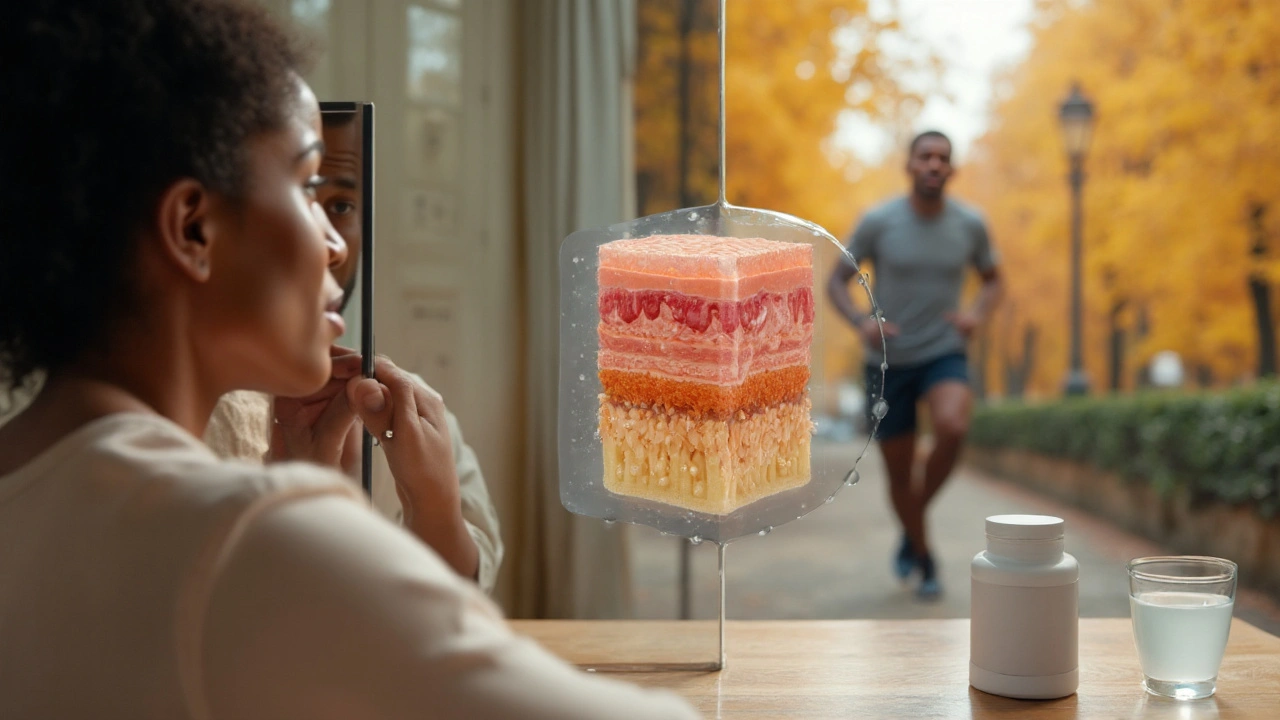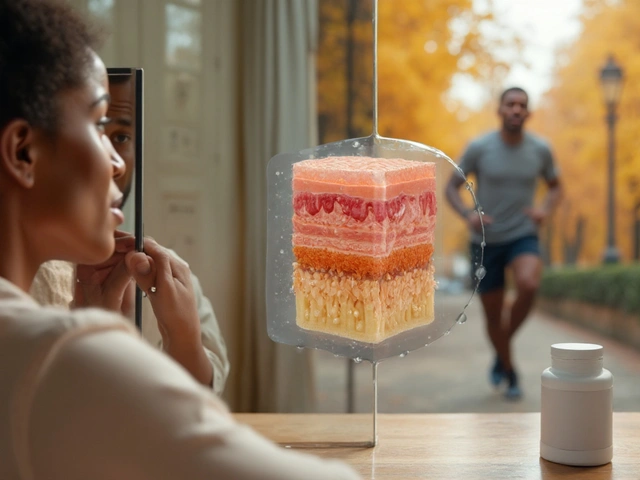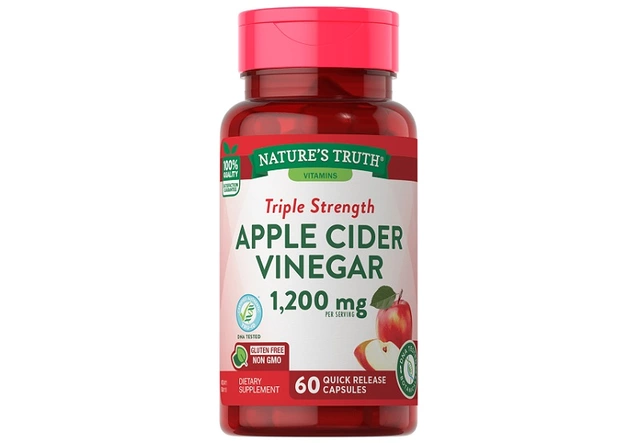You want smoother skin, less creaky joints, and a supplement that actually has data behind it. Not magic-just something that works. That’s what people mean when they ask about BioCell Collagen. Here’s the straight talk on what it is, how it works, how long it takes, and whether it’s worth your money.
- TL;DR: BioCell Collagen is a patented blend of hydrolyzed type II collagen, hyaluronic acid (HA), and chondroitin sulfate from chicken sternum cartilage.
- Evidence suggests it can improve skin hydration/elasticity and ease daily joint discomfort in 8-12 weeks; results build with consistent use.
- Typical dose: 1-2 g/day (often 500 mg twice daily). Pair with vitamin C and adequate protein for best results.
- Safety: Generally well tolerated. Avoid if you’re allergic to chicken; talk to your clinician if you take blood thinners (chondroitin caution) or are pregnant.
- Buy by the logo: Look for the BioCell Collagen trademark, third‑party testing, and a clinically relevant dose. Expect ~$0.50-$1.20/day.
What it is, how it works, and what the science actually says
BioCell Collagen is a branded, standardized ingredient made from hydrolyzed chicken sternal cartilage. It’s not just “collagen powder.” The matrix includes three things your skin and joints care about: hydrolyzed type II collagen (amino acids like glycine, proline, hydroxyproline), hyaluronic acid (for hydration and cushioning), and chondroitin sulfate (a structural glycosaminoglycan found in cartilage). The hydrolyzed form breaks big proteins into smaller peptides for better absorption.
Why does that matter? Collagen peptides do two things: they provide raw materials for your body to rebuild collagen, and they nudge your cells (fibroblasts in skin; chondrocytes in cartilage) to make more of their own collagen and HA. Think of it as fuel plus a gentle “build more” signal.
BioCell’s standardization is the other piece. Most labels deliver roughly 1-2 g/day of the ingredient, standardized to about 60% collagen type II, 20% chondroitin sulfate, and 10% hyaluronic acid. That consistency is why researchers can test it-and why you can compare products fairly.
So what’s the evidence? Two buckets: skin and joints.
- Skin: A randomized, double‑blind, placebo‑controlled trial in the Journal of Medical Food (2012; Schwartz & Park) reported improvements in facial lines and skin dryness over 12 weeks with BioCell Collagen compared with placebo. Systematic reviews in dermatology (Journal of Drugs in Dermatology, 2019; International Journal of Dermatology, 2021) conclude that oral collagen peptides, in general, improve skin hydration, elasticity, and dermal collagen density, especially after 8-12 weeks of daily use.
- Joints: Collagen peptide research shows reduced activity‑related joint discomfort and improved function in athletes and middle‑aged adults (for example, Clark et al., Current Medical Research and Opinion, 2008). Trials on the BioCell Collagen ingredient itself report reduced joint stiffness and discomfort and better recovery from everyday activity-typically noticeable by week 8-12. The chondroitin and HA components make sense here: HA supports joint lubrication; chondroitin supports cartilage structure.
“Oral collagen supplementation increases skin elasticity, hydration, and dermal collagen density in randomized trials, with benefits typically emerging after 8 to 12 weeks.” - International Journal of Dermatology, 2021, systematic review and meta‑analysis
That timeline matters. Collagen isn’t caffeine; it’s construction. Skin and cartilage remodel slowly. If you give it 8-12 weeks, you’re evaluating the supplement fairly.
Let’s anchor the mechanisms to real outcomes. Hydrolyzed collagen peptides are absorbed as small peptides and free amino acids. Studies detect di‑ and tri‑peptides containing hydroxyproline in the bloodstream within hours, and they can reach the skin and cartilage. In skin, fibroblasts respond by producing more collagen and HA. In joints, chondrocytes respond similarly and you support the extracellular matrix that cushions movement. The HA and chondroitin in BioCell complement that by directly supporting hydration and cartilage integrity.
Is the evidence perfect? No. Some trials are small, and outcomes like “wrinkle depth” can vary by method. But taken together-branded‑ingredient trials plus broader collagen peptide data-the signal is consistent: better hydration and elasticity in skin, less everyday joint discomfort, and modest but meaningful improvements by 2-3 months.
| What’s in 1 g BioCell Collagen (approx.) | Role in the body | Evidence highlight | When to expect changes |
|---|---|---|---|
| ~600 mg hydrolyzed type II collagen | Provides amino acids; signals fibroblasts/chondrocytes | Systematic reviews show better skin elasticity/hydration | 8-12 weeks (skin); 8-12+ weeks (joints) |
| ~200 mg chondroitin sulfate | Supports cartilage structure and shock absorption | Long‑term joint comfort support in mixed collagen studies | 8-12+ weeks |
| ~100 mg hyaluronic acid | Hydrates skin; lubricates joints | Oral HA linked to skin moisture and joint function support | 4-8 weeks for skin hydration; 8-12 for joints |
| Other glycosaminoglycans | Matrix support | Adjunct to the main actives | Gradual |

Results you can expect, dose that works, and safety signals
Realistic outcomes first. If your baseline is dry, dull skin and creaky knees after a long walk, the upside is better. If your skin is already great and your joints feel fine, you’ll see subtler changes.
Skin: Expect earlier wins on hydration and plumpness (weeks 4-8), then elasticity and fine lines (weeks 8-12). In trials, wrinkle area and skin dryness scores improved compared with placebo. If you combine BioCell with good basics-SPF, sleep, enough protein, and vitamin C-you stack the deck in your favor.
Joints: People report less morning stiffness, easier stairs, and better comfort through the day by weeks 8-12. If your joint discomfort is clinically significant or you have a diagnosis like osteoarthritis, talk to your clinician; collagen can be part of a plan, but it’s not a replacement for medical care.
Dose and timing that most people use:
- 1-2 g BioCell Collagen per day. Common label: 500 mg taken twice daily with meals.
- Pair with vitamin C (about 75-100 mg/day from food or a small supplement) to support collagen synthesis.
- Hydration helps HA do its thing. Aim for steady fluids through the day.
- Consistency beats "megadoses." Give it 8-12 weeks before you judge.
What if you lift, run, or train? Collagen peptides shine when you give your body a reason to rebuild. If joint comfort is your goal, keep your training smart (progressive load, good form) and use collagen as a support, not a shield. For skin, think of it like daily skincare from the inside: small, consistent dose over time.
Safety and who should avoid it:
- Generally well tolerated. Most common issues are mild: fullness, GI upset if you take it on an empty stomach.
- Allergy: It’s poultry‑derived. Avoid if you’re allergic to chicken.
- Medications: Chondroitin sulfate may potentiate anticoagulants in some cases. If you take warfarin or similar, get your clinician’s OK and monitor.
- Pregnancy/breastfeeding: Safety data are limited for this specific blend. Get personalized advice before using.
- Dietary preferences: Not vegan or vegetarian compatible.
Regulatory reality check: It’s a dietary supplement, not a drug. In the U.S., supplements don’t need pre‑approval for efficacy. Quality varies by brand, which is why the next section matters.
| Goal | What to combine with BioCell | Why it helps | Simple target |
|---|---|---|---|
| Skin hydration/elasticity | Vitamin C, SPF, ceramides, omega‑3s | Vitamin C for collagen synthesis; lipids for barrier; SPF prevents breakdown | Vitamin C ≈100 mg/day; SPF 30+ daily |
| Joint comfort | Protein, smart training, sleep | Recovery + tissue remodeling need amino acids and rest | Protein 1.2-1.6 g/kg/day; 7-9 h sleep |
| Healthy aging | Resistance training, calcium + vitamin D as needed | Supports musculoskeletal health with age | 2-3 sessions/week strength training |

How to choose the right product, avoid pitfalls, and make it work (FAQs + next steps)
Not all “collagen” is the same. Here’s a tight checklist so you don’t waste money.
- Look for the BioCell Collagen trademark on the label. It means you’re getting the patented ingredient and not a random blend.
- Dose: You want enough to match the research-1-2 g/day of the BioCell ingredient. Labels often show serving size in mg.
- Third‑party testing: USP, NSF, or Informed Choice are good signs for purity and potency.
- Allergens and additives: Check for poultry. Skip unnecessary sweeteners and artificial colors if you don’t want them.
- Price per day: Do the math. Total cost ÷ number of servings = cost per day. Aim for $0.50-$1.20/day for solid quality.
- Form: Capsules vs powder. Capsules are easy; powders mix into smoothies. Pick the one you’ll actually take daily.
How does BioCell compare to other collagens?
- Marine collagen (type I): Great for skin/hair/nails; less joint‑specific. Often more expensive.
- Bovine collagen (types I & III): Widely used for skin and general support; usually budget‑friendly.
- Undenatured type II collagen (UC‑II): Tiny dose (40 mg) works via immune tolerance; strong joint data but it’s a different mechanism than hydrolyzed collagen.
- BioCell Collagen: Type II peptides + HA + chondroitin. Good skin hydration/elasticity support with joint comfort benefits; nice all‑rounder if you want both.
Quick decision guide:
- Skin‑first goal with some joint support: Choose BioCell or marine collagen. If you want built‑in HA, BioCell has the edge.
- Joint‑first goal: BioCell or UC‑II (or both, with medical guidance). Collagen peptides plus strength training is a smart combo.
- Budget‑tight: Bovine collagen peptides (type I/III) can help skin; add topical skincare and protein to stretch results.
Mini‑FAQ
- How long until I notice changes? Most people notice skin hydration by week 4-8 and joint comfort by week 8-12. Keep going to week 12 before you decide.
- Do I need vitamin C with it? It helps. You don’t need mega‑doses-dietary vitamin C or ~100 mg/day is enough.
- Can I take it with coffee? Yes. Time of day doesn’t matter as much as consistency.
- Is it safe with medications? Usually, yes. If you take blood thinners or have a bleeding disorder, talk to your clinician first.
- Is it vegan? No. It’s derived from chicken cartilage.
- Can I stack it with other supplements? Common stacks: omega‑3s, ceramides, astaxanthin for skin; glucosamine or UC‑II for joints. Introduce one at a time so you know what’s working.
Pitfalls to avoid
- Judging too early. Four weeks is a checkpoint; twelve weeks is a verdict.
- Underdosing. 100-200 mg won’t cut it. Shoot for 1-2 g/day of BioCell Collagen.
- Ignoring the basics. Sunscreen, sleep, protein, and smart training amplify your results more than any powder can.
- Buying on marketing alone. If the label doesn’t show the BioCell trademark and a clear dose, skip it.
What I’d do if I were starting today
- Pick a product that clearly lists “BioCell Collagen” with 500 mg per capsule. Plan on 2-4 capsules/day (1-2 g total).
- Take it with meals, morning and evening, for 12 weeks. Add vitamin C via food or a small supplement.
- For skin: Track progress with the same lighting and angle photos at week 0, 4, 8, 12. For joints: Rate morning stiffness and stair comfort daily (0-10 scale).
- Keep your routine steady: SPF 30+, two strength sessions per week, protein at each meal, solid sleep.
- At week 12, look at your photos and scores. If you see value, keep the dose. If not, consider switching to a different collagen type or adjusting your goals.
Who tends to see the biggest payoff?
- People 35+ noticing early skin dryness/elasticity changes.
- Active adults with everyday joint niggles who also strength train.
- Anyone whose diet is light on collagen‑rich foods (skin, cartilage, bone broths).
Who should be careful or skip it?
- Poultry allergies-hard pass.
- On anticoagulants-ask your clinician, monitor closely.
- Pregnant or breastfeeding-get personalized advice.
- Vegan-this won’t fit your diet; consider vitamin C, protein, and topical strategies instead.
Receipts: where the claims come from
- Schwartz SR, Park J. Journal of Medical Food, 2012: Double‑blind, placebo‑controlled trial on the BioCell Collagen ingredient showing improvements in facial lines and dryness over 12 weeks.
- Journal of Drugs in Dermatology, 2019: Systematic review of oral collagen for skin health, noting improvements in elasticity and hydration.
- International Journal of Dermatology, 2021: Meta‑analysis confirming increases in skin elasticity, hydration, and dermal collagen density with oral collagen peptides.
- Clark KL et al., Current Medical Research and Opinion, 2008: Athletes saw less activity‑related joint pain with collagen hydrolysate over 24 weeks.
Bottom line: BioCell Collagen isn’t a silver bullet, but it is a smart, evidence‑supported play if you’re after better‑feeling joints and more hydrated, elastic skin. Give it time, dose it right, keep your basics tight, and you’ll know if it earns a spot in your routine.







